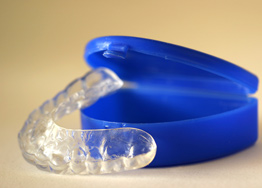24
Bring In The (Night)Guards!: My Fight Against Bruxism and TMJ Disorder

Grinding. It's not just a dance.
Before the Dude and I go to sleep, there is something we can never forget to do before we turn out the lights.
Pop in our nightguards.
We’re major teeth-grinders in our house, otherwise known as Bruxism. For me, this problem is not just at night. I find myself clenching and grinding my teeth when I’m stressed or anxious which, ever since I became a mama, is more often than not.
Unfortunately, Bruxism is not my only issue. I also deal with TMJ Disorder. It’s fairly common to suffer from both.
I remember waking up one morning around the age of 16 with a splitting headache and my jaw in a painful locked position. I couldn’t move it at all and I was terrified. I happened to be visiting with my dad at the time who managed to calm me down and massage my jaw enough for me to move it again. From that day forward, my jaw started to click or pop every time I opened my mouth. It was also occasionally very tender and painful. My dentist at the time shrugged at my complaint and said it was quite common. He also mentioned that there wasn’t much that could be done. When I asked him why this happened, he blamed the problem on the two years of braces (with rubber-bands) I wore from the ages of 13-15. I remember thinking, geesh, had I known the consequences I would’ve lived with snaggle-teeth! Whether or not the braces are to blame can’t be proven. There are many theories as to why 5-15% of the population is affected with a TMJ disorder.
At this point, nearly 18 years later, I still cannot fully open my mouth without having to actually move my jaw in a way that makes an annoying popping sound. The pain and tenderness is something that comes and goes, but I’ve lived with it long enough to know what to do about it. From my own personal experience and based on all the information I’ve gathered over the years, there’s not a whole lot that can be done. There are a number of remedies out there, from pain meds and Botox (hell no!) to yoga and CBT therapy. Being that I am trained and educated in CBT methods, I can easily incorporate what I know into my life. Admittedly, the relaxation methods I use can work very well for me during the day…but when I’m grinding my teeth at night, not so much. I also use massage exercises, acupuncture, and chiropractic methods. Now, if you’ve been reading my blog, you know I’m a huge fan of acupuncture and chiropractors. Acupuncture and chiropractic treatments can work very well for my TMJ /Bruxism issues but, I have to admit, just like almost everything else I’ve tried they can only offer temporary respite.
The bottom line is that there is no cure. If you have Bruxism and/or TMJ issues, you will have to learn how to manage the symptoms. Very few people have a serious enough case that requires surgery. And, even then, surgery is no guarantee for a cure. Other than make some lifestyle changes, like reducing or eliminating gum and foods that require more chewing (buh-bye, steak!), and incorporating daily relaxation and massage exercises, the nightguard is really the best course of action I have found. Don’t just get any nightguard, though. Spend the few extra bucks and have your dentist create a custom-fit nightguard. They run about $300-$400 and some insurance companies cover at least half of the cost.
It’s not that fun to wear a nightguard every night and it certainly isn’t sexy, either. But when your spouse or partner wears one, too, it makes it a bit more enjoyable. The Dude and I always have a laugh when we kiss each other good-night as our nightguards click. It can also be useful for setting the mood. If one of us comes to bed without wearing our nightguard, well, let’s just say that the nightguard code works well.
Sweet dreams, indeed.


